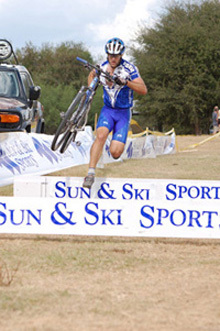Nature Beats Science As Modern Day Athlete Eats `Caveman' Bars To Beat His Competition
January 20, 2010 (PRLEAP.COM) Sports News
A famous advertising slogan once said, "It's so easy a caveman could do it." For cyclist Greg "Caveman" Parham, the Paleo Diet, a regimen that dates back to early times when cavemen simply feasted upon nuts and berries, was a cinch to adapt to and has helped Parham to increase his strength, energy and athletic performance. Parham began the Paleo Diet in January 2009 to improve his athletic performance and energy levels during the day. Instead of relying on the high-carb/high-protein diet favored by most athletes, the Paleo Diet takes meals back to the Stone Age. Also known as "the Caveman" diet, it is based on the diet of human's early hunter-gatherer ancestors. The paleo diet eliminates processed foods like pasta, bread, rice and candies.
The regimen incorporates the nutritional and healthy diet that humans are designed to eat – fruits, vegetables, nuts, seeds and animals. These foods are high in beneficial nutrients such as soluble fiber, antioxidant vitamins, phytochemicals, omega-3 and monounsaturated fats, and low-glycemic carbohydrates that promote good health.
A diet made for a caveman is perfect for an athlete who prefers to live up to the caveman pact of being in touch with nature and themselves. Paleo Diet enthusiast and author of the Paleo Cookbooks, Nikki Young, recently spoke with Parham about his experience with making the switch to the Paleo Diet.
By strictly adapting to the diet, Parham was able to finish at the top ranks of the Xterra regional events within a year of beginning. Since starting the diet, Parham noticed a trend of increased benefits in his athletic performance including less recovery time following workouts and races as well as not depending on carbohydrates.
"In general, I have this huge weight lifted off my chest not having to worry so much about what I should eat and drink," Parham notes.
"Athletes are bombarded by supplement companies, all claiming their products are better than the other. Should I use Gatorade? Hammer Nutrition? Eas? Clif Bar? Cytomax? Powerbar? The list goes on and on. The answer: none of them. Nature is smarter than science. By rejecting these claims and having all out faith in the Paleo Diet, I not only save a lot of money on supplements, but have a mind at ease that I don't need them."
Because Parham competes in strenuous 6, 12 and 24 hour events, stamina and strength is everything. While he drinks a beverage known as Puresport, he also noshes on homemade "Caveman" energy bars. He does rely on carbs because of the intensity of his races, but they are instantly burned.
During grueling races, Parham says he counts on Puresport, caveman energy bars, beef jerky, and fruit, such as grapes, strawberries, and bananas.
The Paleo way of mind is not only adapted to Parham's athletic lifestyle. He's adapted it to other areas of his life.
"Nowadays, I'm also getting more sleep, freeing my life of clutter, exercising my brain more (such as reading), spending less time online, and more time outside to name a few," Parham says. "I've also changed the way I train to reduce stress, yet promote more fitness."
For more from the interview, as well as Parham's Caveman bar recipe, visit the Living Paleo website at http://tinyurl.com/yaj5ss3
About Greg "Caveman" Parham:
Parham is a multi-sport athlete based out of Austin, TX. An architect by day, he maintains his fitness by participating in mountain biking, running, swimming, cyclocross, and road racing. He adopted the Paleo Diet in January 2009. His personal blog is online at http://www.gregparham.wordpress.com.
The Paleo Diet:
The Paleo Diet consists of meat, fish, vegetables, fruits, nuts and seeds. The Paleo Cookbooks provide 310 easy to follow recipes with step by step instructions to help you create delicious meals from wholesome nutritious foods, designed to provide the human body with the nutrition needed for optimal health. The Paleo Cookbooks can be ordered at http://www.paleocookbook.com


